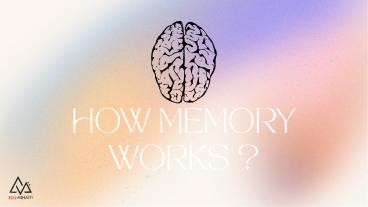EVERYTHING YOU WANTED TO KNOW ABOUT YOUR MEMORY
Title:
EVERYTHING YOU WANTED TO KNOW ABOUT YOUR MEMORY
Description:
With 86 billion nerve cells, 400 miles of capillary walls, 100,000 miles of nerve fibres, and more than 10 trillion synaptogenesis, the neural network is a technological marvel. Day after day, it is reloaded with new memories. What is the maximum amount of storage your brain can hold? – PowerPoint PPT presentation
Number of Views:2
Title: EVERYTHING YOU WANTED TO KNOW ABOUT YOUR MEMORY
1
(No Transcript)
2
Memory
Memory refers to the processes that are used to
acquire, store, retain, and later retrieve
information. Human memory involves the ability
to both preserve and recover information we have
learned or experienced. However, this is not a
flawless process. Sometimes we forget or
misremember things.
3
How Brain Functions ?
- There are several factors responsible which are
as follows - Memory Process
- Encoding It is the method to convert knowledge
into useful format in order to build new
thoughts. - Storage After the data has been successfully
encoded, it should be saved in brain for
subsequent use which is called as Storage. - Retrieval It allows us to bring stored memories
into conscious awareness. - Type of Memory
- Sensory Memory It is the earliest age of memory
where information is stored for a very brief
period. - Short Term Memory Also known as active memory,
It contains the information we are currently
aware of or thinking about. It keeps information
for approximately 20 to 30 seconds. - Long Term Memory It is the process of storing
information indefinitely. Some of the knowledge
is quite easy to recollect while other are
considerably more challenging. It appears to have
nearly limitless capacity.
4
What is Forgetting?
- It refers to loss of information from long term me
mory. There are mainly 4 types of factors
responsible which are as follows - Failure to keep These are the memories which are
not stored properly in the long-term memory
called as failure to store or keep memories. - Failure to Retrieve Retrieval Failure is where t
he information is in long term memory but cannot
be accessed. - Forgotten for a purpose We may purposefully
forget memories at times. This is especially true
when recalling traumatic or distressing events
or experiences. - Interference The information which has been rest
ricted or interrupted while attempting to store
is called interference. - What is Aging or Memory loss ?
- Memory loss as people become older is common. It
should not prevent someone from leading a full
and fruitful life. Memory changes are usually
controllable and dont interfere with your
ability to study, lead a normal life, or build
healthy relationships.
5
Rehersal Buffer
Successfully Coded For Storage in LTM
Long Term Memory (LTM)
Short Term Memory
Selective Attention
Sensory Memory
Incoming Information
If Not Attended - Forgotton
Process of Storing Information or Creating a
Memory
6
Tips to make Memory Stronger
- No matter how great your memory is, there are
probably a few things you can do to make it even
better. - Jot it down. The act of writing with a pen and
paper helps implant the memory into your
brainand can also serve as a reminder or
reference later. - Attach meaning to it. You can remember something
more easily if you attach meaning to it. For
instance, if you associate a person, you just
meet with someone you already know, you may be
able to remember their name easier. - Repeat it. Repetition helps the memory become
encoded beyond your short-term memory. - Group it. Information that is categorized becomes
easier to remember and recall. For example,
consider the following group of words Desk,
apple, bookshelf, red, plum, table, green,
pineapple, purple, chair, peach, yellow. Spend a
few seconds reading them, then look away and try
to recall and list these words. - In addition, keeping your brain healthy by
exercising regularly, maintaining social
connections, managing stress, and performing
challenging activities (like doing crossword
puzzles or playing an instrument) have been
proven to help boost memory. - Human memory is a complex process that
researchers are still trying to better
understand. Our memories make us who we are, yet
the process is not perfect. While we can remember
an astonishing amount of information, we are
also susceptible to mistakes and errors.
7
Please visit our webpage _at_ www.eduminatti.com































